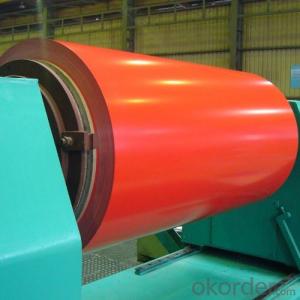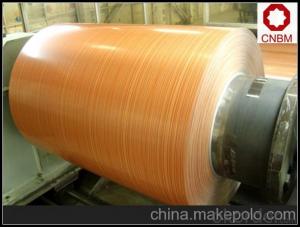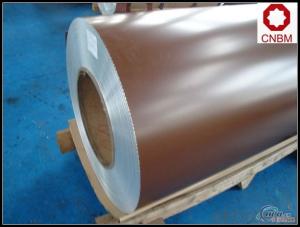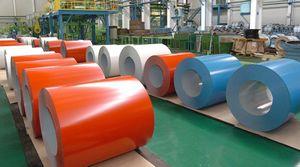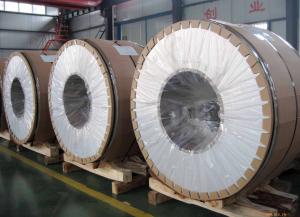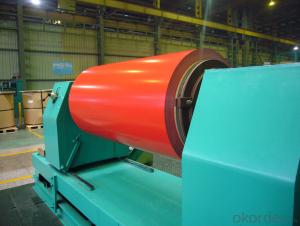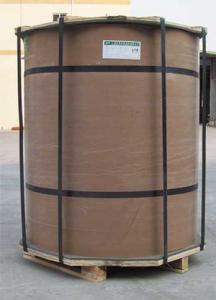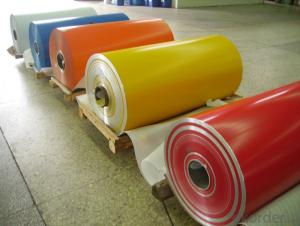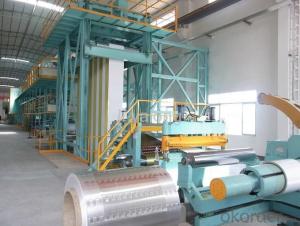China 3003 PVDF Coated Aluminum Coil-3XXX
- Loading Port:
- China Main Port
- Payment Terms:
- TT OR LC
- Min Order Qty:
- -
- Supply Capability:
- -
OKorder Service Pledge
OKorder Financial Service
You Might Also Like
Product Description:
1 Specifications of PVDF Coated Aluminum Coil/Sheet
Alloy | AA1050,AA1060, AA1070, AA1100, AA3003, AA3004, AA3005, AA3105, AA5005, AA5052, AA5754, AA5083, AA8011 |
Temper: | H12, H14, H16, H18, H22, H24, H26, H32,HO, F |
Thickness: | 0.10-4.0mm |
Width: | 10mm- 2000mm |
Coating | PVDF |
Painting Thickness | Standard 16-25 microns, max 40 microns |
Color | Acording to Ral colors or customer’s samples |
Standard: | GB/T17748-1999, ASTM, ISO, EU standard |
Special Specification is available on customer’s requirement | |
PVDF(fluorine-carbon) Coating
PVDF(fluorine-carbon) coating :made of fluorine carbon resin, pigment, ester solvent, after high temperature roasting and baking, the paint is solidified to dry film with super weather resistance. PVDF coating also can be classified as traditional PVDF and nanometer PVDF coating.
A.Traditional PVDF Coating, with KYNAR500 PVDF, two or three times for coating and baking, has good properties of anti-acid, anti-alkali and is durable in atrocious weather and environment, keeping 15 years no unwonted fading. In view of these facts, we recommend this panel applied for external wall cladding.
B.Nanometer PVDF Coating, which different with traditional PVDF is the clear coating. It contains nanometer element, which can protect panel from pollution, Because nanometer has self-cleaning effect, It easy to get rid of dust and pollution by raining or water.
- Q: What are some normal everyday products made from aluminum that I can use to recycle?
- cool drink cans.
- Q: Are there any specific regulations for the transportation of aluminum coils?
- Yes, there are specific regulations for the transportation of aluminum coils. These regulations typically include guidelines for securing the coils properly to prevent shifting or damage during transit. Additionally, there may be requirements for labeling, documentation, and handling procedures to ensure the safe transportation of aluminum coils.
- Q: What are the common surface finishes for aluminum coils in the automotive industry?
- Aluminum coils are extensively utilized in the automotive sector for various purposes due to their lightweight, high strength, and resistance to corrosion. To safeguard them from environmental elements and improve their appearance, aluminum coils in the automotive industry often undergo surface treatments. Anodizing is one of the most prevalent surface treatments for aluminum coils in the automotive industry. It is an electrochemical process that forms a thin protective layer on the surface of the aluminum coil. This treatment not only offers excellent corrosion resistance but also allows for customization of colors, making it a popular choice for automotive applications. Anodized aluminum coils can be found in a variety of colors and finishes, adding aesthetic appeal to vehicles. Another commonly employed surface treatment for aluminum coils in the automotive industry is powder coating. This technique involves applying dry powder paint onto the aluminum coil's surface and then curing it under heat to create a durable and long-lasting finish. Powder coating provides exceptional resistance to chipping, scratching, and fading, making it ideal for automotive components exposed to harsh conditions that require high durability. Moreover, powder coating offers a wide range of color options, enabling manufacturers to achieve the desired aesthetic appearance. Additionally, aluminum coils in the automotive industry may undergo other surface treatments like laminating, painting, or polishing, depending on specific application requirements. Laminating involves bonding a thin protective film onto the surface of the aluminum coil to provide additional protection against abrasion and chemical exposure. Painting entails the application of liquid paint onto the aluminum coil's surface, allowing for customization and protection against corrosion. Polishing, on the other hand, is a mechanical process that enhances the surface smoothness and appearance of the aluminum coil, resulting in a reflective and glossy finish. To summarize, the automotive industry commonly employs surface treatments such as anodizing, powder coating, laminating, painting, and polishing for aluminum coils. These treatments not only enhance the appearance of the aluminum coils but also provide protection against corrosion, abrasion, and other environmental factors, making them indispensable in the manufacturing of automotive components.
- Q: how many chloride ions are present? how many chlorine ions are present? what is the mass in grams of one formula unit of aluminum chloride?
- Aluminum Chloride is simply AlCl3 So In each mole of AlCl3 there are 1 mol of Al 3 mol of Cl We know (from periodic table), 1 mol of Al weighs 26.98 g 1 mol of Cl weighs 35.47g so 1 mol of AlCl3 weighs 26.98g + 3x35.47g = 133.39 g sooo moles of AlCl3 = 37.2 g /133.39 g/mol = 0.279 mol in one mol of anything, there are 6.02 x 10 ^ 23 of that thing... so we have 0.279 mol x 6.02 x 10 ^ 23 molecules /mole = 1.68 x 10 ^ 23 And, we know one molecule of AlCl3 dissociates into one Al ion and 3 Cl ions sooo 1.68 x 10 ^ 23 AlCl3 ions dissociate into 1.68 x 10 ^ 23 Al ions so answer is 1.68 x 10 ^ 23 Al ions
- Q: How are aluminum coils used in the production of cookware?
- Aluminum coils play a crucial role in the production of cookware due to their unique properties and versatility. These coils are used as the primary material in the manufacturing process of various types of cookware, including pots, pans, and baking sheets. Firstly, aluminum coils are known for their excellent heat conductivity, which allows for efficient and even heat distribution throughout the cookware. This property ensures that food is cooked evenly and reduces the chances of hot spots or uneven cooking. This is particularly important for achieving optimal cooking results and preventing food from burning or sticking to the cookware. Secondly, aluminum coils are lightweight yet durable, making them ideal for cookware production. The lightweight nature of aluminum ensures that the cookware is easy to handle and maneuver while cooking, reducing the risk of accidents or injuries. Additionally, aluminum's durability ensures that the cookware can withstand high temperatures, constant use, and the rigors of everyday cooking without warping or deforming. Furthermore, aluminum coils are highly resistant to corrosion and rust, making them suitable for cookware that comes into contact with food and liquids. This property ensures that the cookware remains hygienic and safe for cooking purposes, as aluminum does not react with acidic or alkaline ingredients commonly used in cooking. Moreover, aluminum coils are malleable and can be shaped into various cookware designs, including pots, pans, and bakeware with different sizes, shapes, and depths. This flexibility allows for the production of cookware that caters to different cooking techniques and preferences. In terms of production, aluminum coils are typically subjected to a series of manufacturing processes, such as rolling, annealing, and stamping, to transform them into the desired cookware shape. These processes ensure the final cookware product meets the required specifications in terms of thickness, strength, and appearance. In conclusion, aluminum coils are essential in the production of cookware due to their excellent heat conductivity, lightweight yet durable nature, resistance to corrosion, and malleability. These properties enable the creation of high-quality cookware that provides efficient and even cooking results, durability, and ease of use. Overall, aluminum coils contribute significantly to the functionality and performance of cookware, making them a popular choice in the industry.
- Q: This question asks about potential safety hazards when using electric heaters that have aluminum coils.
- <p>While electric heaters with aluminum coils are generally safe when used properly, there are some safety concerns to consider. Aluminum can heat up quickly and may become very hot, posing a risk of burns if touched. Additionally, aluminum coils can corrode over time, potentially leading to electrical shorts or fires. It's important to ensure that the heater is not covered or obstructed, as this can cause overheating. Always follow the manufacturer's instructions for use and safety precautions. Regularly inspect the heater for any signs of damage or wear, and never use a heater with a damaged cord or plug.</p>
- Q: How do aluminum coils withstand extreme weather conditions?
- Due to the unique properties of aluminum, aluminum coils can endure harsh weather conditions. Firstly, aluminum's lightweight nature allows it to remain flexible and resistant to bending or warping when faced with strong winds or heavy snow loads. As a result, aluminum coils are less likely to be damaged during extreme weather events like hurricanes or blizzards. Moreover, aluminum possesses a high resistance to corrosion. When exposed to air, it forms a protective oxide layer on its surface, preventing rusting or deterioration caused by moisture or severe weather conditions. This protective layer acts as a barrier against elements such as rain, snow, or saltwater, making aluminum coils highly durable and long-lasting. Additionally, aluminum exhibits high thermal conductivity, enabling it to efficiently dissipate heat. This property ensures that aluminum coils effectively transfer heat away from the system, preventing overheating and potential damage during hot weather conditions. Furthermore, the efficient dissipation of heat contributes to the energy efficiency of aluminum coils. Lastly, aluminum is a non-magnetic material, rendering it unaffected by electromagnetic interference or lightning strikes. This quality makes aluminum coils safe and dependable in areas prone to electrical storms or high levels of electromagnetic activity. To summarize, aluminum coils are designed to endure extreme weather conditions due to their lightweight, corrosion-resistant, thermally conductive, and non-magnetic properties. These characteristics make aluminum coils highly durable, dependable, and suitable for various applications, including HVAC systems, automotive cooling, and electrical wiring.
- Q: Can aluminum coils be used in the production of aluminum honeycomb panels?
- Yes, aluminum coils can be used in the production of aluminum honeycomb panels. Aluminum coils are commonly used as the primary material for making aluminum honeycomb panels. The coils are typically processed and shaped into thin sheets or layers, which are then bonded together with an adhesive to form the honeycomb structure. This lightweight and durable structure makes it ideal for various applications, such as aerospace, construction, and transportation industries.
- Q: How are aluminum coils typically stored and transported?
- Aluminum coils are typically stored and transported in a horizontal position. They are often secured with straps or bands to prevent movement during transportation. Additionally, they are usually stored in a covered or enclosed area to protect them from environmental factors such as moisture or dust.
- Q: Can aluminum coils be used in food processing or packaging?
- Yes, aluminum coils can be used in food processing or packaging. Aluminum is widely used in the food industry due to its excellent properties such as being lightweight, non-toxic, and resistant to corrosion. These properties make it an ideal material for food processing and packaging applications. Aluminum coils can be used to make various food packaging products such as cans, lids, foils, and trays. They provide a barrier against oxygen, moisture, and light, which helps to preserve the freshness and quality of food products. Additionally, aluminum coils are easy to shape, form, and seal, allowing for efficient and effective packaging solutions. Overall, aluminum coils are a popular choice for food processing and packaging due to their versatility, durability, and safety.
Send your message to us
China 3003 PVDF Coated Aluminum Coil-3XXX
- Loading Port:
- China Main Port
- Payment Terms:
- TT OR LC
- Min Order Qty:
- -
- Supply Capability:
- -
OKorder Service Pledge
OKorder Financial Service
Similar products
Hot products
Hot Searches
Related keywords
